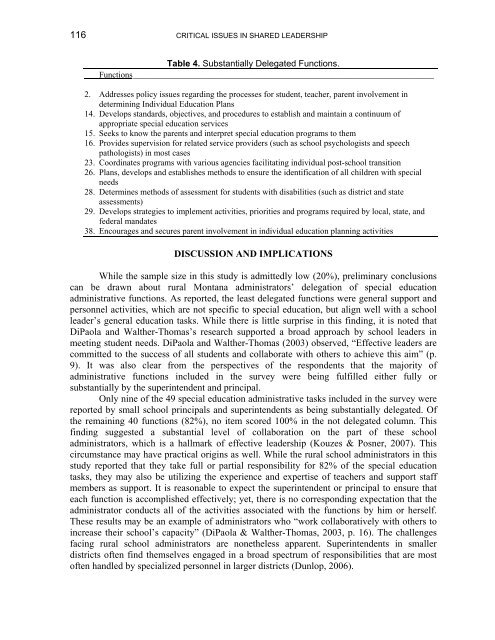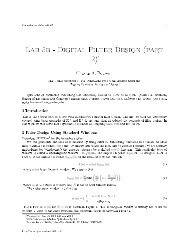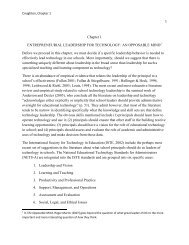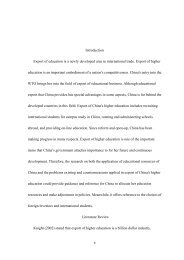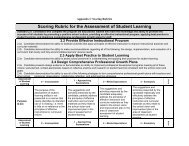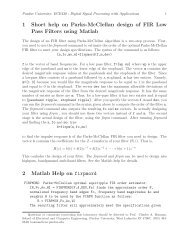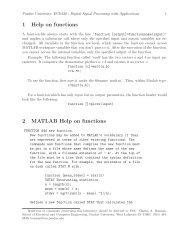Blazing New Trails - Connexions
Blazing New Trails - Connexions
Blazing New Trails - Connexions
Create successful ePaper yourself
Turn your PDF publications into a flip-book with our unique Google optimized e-Paper software.
116 CRITICAL ISSUES IN SHARED LEADERSHIP<br />
Table 4. Substantially Delegated Functions.<br />
Functions_______________________________________________________________________<br />
2. Addresses policy issues regarding the processes for student, teacher, parent involvement in<br />
determining Individual Education Plans<br />
14. Develops standards, objectives, and procedures to establish and maintain a continuum of<br />
appropriate special education services<br />
15. Seeks to know the parents and interpret special education programs to them<br />
16. Provides supervision for related service providers (such as school psychologists and speech<br />
pathologists) in most cases<br />
23. Coordinates programs with various agencies facilitating individual post-school transition<br />
26. Plans, develops and establishes methods to ensure the identification of all children with special<br />
needs<br />
28. Determines methods of assessment for students with disabilities (such as district and state<br />
assessments)<br />
29. Develops strategies to implement activities, priorities and programs required by local, state, and<br />
federal mandates<br />
38. Encourages and secures parent involvement in individual education planning activities<br />
DISCUSSION AND IMPLICATIONS<br />
While the sample size in this study is admittedly low (20%), preliminary conclusions<br />
can be drawn about rural Montana administrators’ delegation of special education<br />
administrative functions. As reported, the least delegated functions were general support and<br />
personnel activities, which are not specific to special education, but align well with a school<br />
leader’s general education tasks. While there is little surprise in this finding, it is noted that<br />
DiPaola and Walther-Thomas’s research supported a broad approach by school leaders in<br />
meeting student needs. DiPaola and Walther-Thomas (2003) observed, “Effective leaders are<br />
committed to the success of all students and collaborate with others to achieve this aim” (p.<br />
9). It was also clear from the perspectives of the respondents that the majority of<br />
administrative functions included in the survey were being fulfilled either fully or<br />
substantially by the superintendent and principal.<br />
Only nine of the 49 special education administrative tasks included in the survey were<br />
reported by small school principals and superintendents as being substantially delegated. Of<br />
the remaining 40 functions (82%), no item scored 100% in the not delegated column. This<br />
finding suggested a substantial level of collaboration on the part of these school<br />
administrators, which is a hallmark of effective leadership (Kouzes & Posner, 2007). This<br />
circumstance may have practical origins as well. While the rural school administrators in this<br />
study reported that they take full or partial responsibility for 82% of the special education<br />
tasks, they may also be utilizing the experience and expertise of teachers and support staff<br />
members as support. It is reasonable to expect the superintendent or principal to ensure that<br />
each function is accomplished effectively; yet, there is no corresponding expectation that the<br />
administrator conducts all of the activities associated with the functions by him or herself.<br />
These results may be an example of administrators who “work collaboratively with others to<br />
increase their school’s capacity” (DiPaola & Walther-Thomas, 2003, p. 16). The challenges<br />
facing rural school administrators are nonetheless apparent. Superintendents in smaller<br />
districts often find themselves engaged in a broad spectrum of responsibilities that are most<br />
often handled by specialized personnel in larger districts (Dunlop, 2006).


